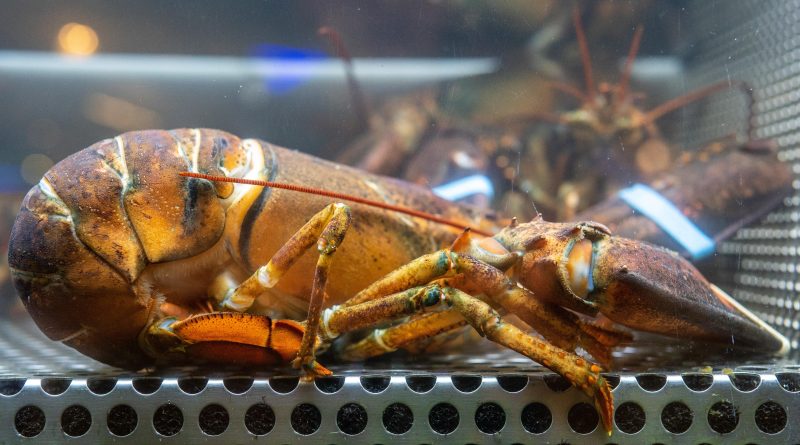Make Grocery Stores Stop Selling Live Animals
Image by Nicholas_Demetriades from Pixabay
Recent science has demonstrated that lobsters, fish and other sea creatures are as sensitive to pain and stress as mammals. In the U.K. Crustaceans have been recognized as sentient beings in an amendment to the Animal Welfare (Sentience) Bill. A review of the research to back up recognition of their sentience is available from the London School of Economics and Political Science and can be seen here.
This post contains two actions that you can take: a letter writing action from ADAV and a petition from Animal Justice that you can sign. Please note that in a response to one letter writer, Thriftys claims to take good care of its lobsters and crabs. However, the store knows full well that they are destined to be boiled alive – the most common way of cooking them.
1. Letter Writing:
Please consider sending a letter to the following grocery stores and any others where you see live animals being sold. Most grocery stores also have contact info up on their websites that allow for electronic letters as well.
- Sobeys Inc (own Thriftys). CEO. Michael B. Midline
115 King Street. Stellarton. Nova Scotia. B0K 1S0 - Loblaws Companies Ltd. CEO. Per Bank
1 President’s Choice Circle, Brampton. Ontario. L6Y 5S5 - T&T Supermarket Inc. CEO Tina Bank
21500 Gordon Way. Richmond. BC. V6W 1J8
Sample letter text:
Dear Manager,
We urge you to end the presence of live crabs and lobsters in your store.
The UK government has declared that lobsters, crabs, octopuses and related species will be included under the new Animal Welfare (Sentience) Bill. This paves the way for legal protection from practices like being boiled alive and having the tendons of their pincers cut.
The government ruling is based on a recent report on the likelihood of sentience in cephalopods and decapod crustaceans and came from the London School of Economic.
“Sentience is the ability to have feelings, such as pain, distress, or comfort. Scientific evidence about the complex behaviour and nervous systems of these animals has been accumulating over recent decades, and it has led us to conclude that there is a strong likelihood of these species being sentient.”
“We are really pleased that the government has decided to protect cephalopods and decapods following our report. Nothing will change immediately, but it means that there is now a legal mechanism to allow them to be protected from unnecessary suffering in the future.”
– Dr. Charlotte Burn, a co-author on the report
As a loyal customer, I would be so pleased to see my local store carry the banner of compassion for our fellow beings. We will still be seeing meat and seafood in your store, but the presence of live beings whose welfare cannot be safeguarded nor their deaths be ensured to be humane is unendurable to a caring customer.
2. Petition from Animal Justice:
Note: We are told the petition should say lobsters travel up to 100 miles year, not 100 meters per year. That would be 160 kilometers! We’ve asked the person who mentioned this to contact the petition creator directly. We are unable to change a petition we didn’t create.
Text from Petition (button to sign appears below it):
At supermarkets across Canada, lobsters are crammed into tiny barren tanks. This is cruel to lobster as they are complex animals who feel pain and can experience distress from being in crowded environments. They are solitary animals that prefer to spend much of their time in the dark. They move around the ocean and can travel up to 100 meters in a year. Lobsters in the wild can also live past 100 years of age!
Researcher Michael Kuba says that lobsters are “quite amazingly smart animals”, and Neurobiologist Tom Abrams says that lobsters have “a full array of senses”.
At grocery stores, the lobster tanks are overcrowded, the stores are very bright, the lobsters can’t move around, and they are forced to live like that day after day. Studies confirm that lobsters kept in tanks suffer from stress associated with confinement, low oxygen levels, overcrowding, and starvation.
Lobsters lead complex social lives. They recognize other lobsters as individuals, and they know where they live. Lobsters and fish are recognized by experts as being capable of experiencing great suffering and distress. Scientists in the European Union classify lobsters as “category I” – that is, animals who experience pain. Also in this category are dogs, cats, chickens, pigs, and humans.
The Criminal Code of Canada contains language that criminalizes the causing of unnecessary pain, suffering, or injury to animals. Yet, this is what is occurring at Canadian grocery stores.
The Aquatic Animal Alliance recommends that sea life should have access to appropriate environments that enable their wellbeing, in conditions that promote good psychological health, and with sufficient space and materials required to let them express their natural behaviours.
After hearing from concerned customers, some grocery chains have discontinued the sale of live lobsters! We can send a message to all other grocery stores that this cruelty will not be tolerated.
Thank you!





